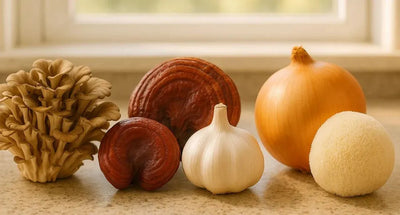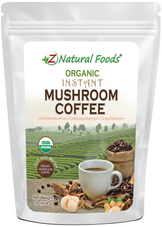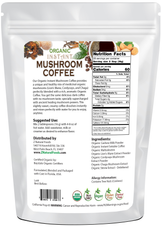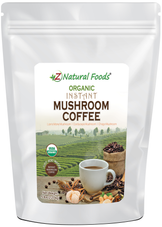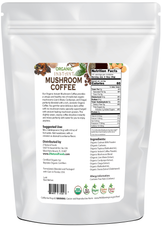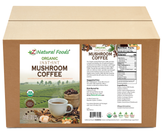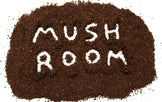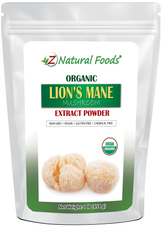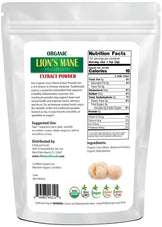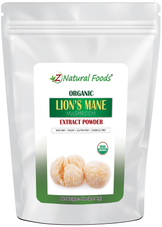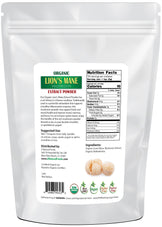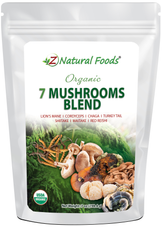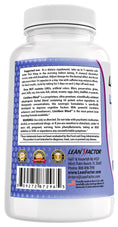Description
Description
The human brain is one of life's great mysteries and perhaps one of the most complex organs in the human body.
While research has helped us understand some of these mysteries, there is still so much we must learn about the human brain.
On the other hand, medicinal mushrooms contain a wide array of nourishing compounds that work synergistically to possibly support overall well-being.
While all mushrooms have certain nutritive qualities in common, they also have unique attributes.
One of these mushrooms that have risen in popularity due to its possible brain-supporting compounds is the Lions Mane mushroom.
Our mission is to answer your questions and provide a thorough explanation and the critical details necessary to understand the topic. So, today we will answer the question…
How does Lion’s Mane affect the brain?
In order to correctly answer the question of how Lion’s Mane affects the brain, it is essential to understand a well-known general category and terms, such as nootropics, neurogenesis, and neuroplasticity, used to describe a host of different compounds and their potential effects on numerous aspects of neurological well-being.
Nootropics Defined
Nootropics are a category of substances (both natural and synthetic) that show potential for improving cognitive function via relaxation, supporting a healthy mood, memory, attention, and creativity.
The Romanian psychologist Corneliu Giurgea first defined the term Nootropic and was also the first to synthesize one of the most well-known substances in this general category, Piracetam, in 1964.
The Giurgea Nootropic Criteria states that for any substance to be considered a nootropic, it must do the following:
- Enhance learning and memory.
- Enhance the resistance of learned behaviors/memories to conditions that tend to disrupt them.
- Protect the brain against a broad spectrum of physical or chemical injuries.
- Increase our ability to focus and pay attention
- Lack of common side effects that are related to other psychotropic drugs
- Be non-toxic at clinical dosages
Neurogenesis and Neuroplasticity Defined
Neurogenesis is the growth and development of nerve tissue. According to a review article in Frontiers, neurogenesis function, “The neural proliferate, migrate, and differentiate into mature neurons that eventually form the central nervous system.” From what we know about this very complex process, neurogenesis may play a role in memory, learning systems, and protecting the brain from the pitfalls of chronic stress.
Neuroplasticity is “The ability of the nervous system to change its activity in response to intrinsic and extrinsic stimuli by reorganizing its structure, functions, or connections after injuries.” Simply put, the brain can change and adapt due to experiences. For example, it is finding a new way to the store or remembering someone’s name.
According to a conference paper, Evidence for four forms of Neuroplasticity,
“We suggest that at least four major forms of functional neuroplasticity can be studied in normal human subjects and patients. The four forms of functional neuroplasticity are homologous area adaptation, cross-modal reassignment, map expansion, and compensatory masquerade.
Homologous area adaptation is the assumption of a particular cognitive process by a homologous region in the opposite hemisphere. Cross-modal reassignment occurs when structures previously devoted to processing a particular kind of sensory input now accept input from a new sensory modality. Map expansion is the enlargement of a functional brain region on the basis of performance. Compensatory masquerade is a novel allocation of a particular cognitive process to perform a task.
By focusing on these four forms of functional neuroplasticity, several fundamental questions about how functional cooperation between brain regions is achieved can be addressed.”
Lion’s Mane: The Nootropic of the Mushroom World
While other medicinal mushrooms affect the mind and spirit in unique and profound ways, Hericium Erinaceus, aka Lion’s Mane, is considered the true nootropic of the fungi world. This robust traditional Chinese Medicine tonic is known and traditionally used in TCM to fortify the spleen and nourish the “five” internal organs (liver, lungs, spleen, heart, and kidneys); it also supports good digestion and general vigor.
While there are some very intriguing human studies, most studies on Lion’s mane are animal, in vitro, and in vivo models. These studies show great potential for the neuro-supportive effects of lion’s mane mushrooms, precisely, their impact on neuroplasticity and neurogenesis.
Lion’s Mane mushrooms contain many bioactive compounds, including
- Polysaccharides
- Polypeptides
- Beta-glucans
- Prebiotic fiber
- Hericenones
- Erinacines
Is there scientific evidence for Lion’s Mane?
- Preliminary research on Lion’s Mane suggests its potential to support the process of neurogenesis, thereby possibly preventing and repairing nerve damage.
- Hericenones and Erinacines are shown to cross the blood-brain barrier, potentially stimulating nerve growth factor (A protein that plays a role in the maintenance, survival, and regeneration of neurons), which benefits those at high risk for “brain injury.”
- In a small double-blind, placebo-controlled human study understanding the effects Lion’s Mane mushrooms have on mild cognitive impairment, “ At weeks 8, 12 and 16 of the trial, the Yamabushitake group showed significantly increased scores on the cognitive function scale compared with the placebo group. The Yamabushitake group's scores increased with the duration of intake, but at week 4, after the termination of the 16 weeks of intake, the scores decreased significantly. Laboratory tests showed no adverse effect of Yamabushitake. The results obtained in this study suggest that Yamabushitake is effective in improving mild cognitive impairment.”
- In a randomized controlled trial looking at the effects Lion’s Mane has on depression and anxiety after four weeks, “Our results show that HE intake has the possibility to reduce depression and anxiety, and these results suggest a different mechanism from NGF-enhancing action of H. Erinaceus.” This study suggests that Lion’s Mane does not increase serotonin levels but stabilizes blood serotonin levels and dopamine. These findings may show significant benefits in depressed people.
- A double-blind, placebo-controlled study evaluated the improvement of cognitive function(using three tests)after taking lion’s mane for 12 weeks. It was reported that just from one of the tests alone, the lion’s mane significantly improved cognitive function and prevented deterioration.
Is Lion’s Mane good for brain health?
In simple terms, the answer to this question is Yes.
This powerful tonic mushroom shows excellent potential in supporting various aspects of brain and mental health.
Much work is still needed, and more research is required in order to solidify a more in-depth understanding of how lion’s mane mushroom works in humans.
Nonetheless, seeing the evidence for potentially unlimited uses for neurological health is slowly proving very exciting.
For more information about our Organic Lion’s Mane Mushroom Extract powder, please go here:
Organic Lions Mane Mushroom Extract Powder
For more information about one of the most powerful nootropics ever developed, powered by adaptogen herbs and other natural herbs including Lion’s Mane mushroom, check out Limitless Mind:
To review all of our Mushroom Powders, please go here:
